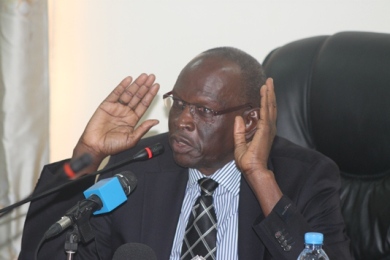S. Sudan opposition alliance want currency exchange rate revoked
December 19, 2015 (JUBA) – An alliance of 18 South Sudanese political parties have called for the revocation of the foreign exchange rate policy, arguing that the decision would increase the suffering of ordinary people.

More attention, it added, should be directed to fighting corruption, protecting the lower income levels, promotion of production and encouraging investments.
According to members of the opposition alliance, the surprise introduction of the foreign rate policy should have been done in a favourable environment especially at a time when guns were silent and implementation of peace deal done.
“Our concern is the propensity of this government to move from one ill-advised policy to another half-baked one. In this, our suffering people become the guinea pig of experiments in bad economics”, stressed the alliance’s statement.
The statement further warned that the situation could deteriorate should the government ignore what the population was going through and continue pushing for the implementation of the reform without implementing peace.
Changes in exchange rates prompted increases in prices of consumer goods and where as some shops closed, other traders returned with goods to sources of import on learning about new custom charges at entry points.
“On Wednesday [last week] for instance, the prices of some of the consumable goods increased drastically. The price of a bag of flour rose from 450 to 975 SSP, bag of sugar from 650 to 1,250. A litre of fuel now sells at 22 SSP, up from just 6 SSP. The transport fares have also gone up drastically. The worst has yet to come,” the alliance warned.
CENTRAL BANK ANNOUNCEMENT
Last week, the Bank of South Sudan (BoSS) abandoned its fixed exchange rate and surrendered its local currency (SSP) to trade freely in the market against the US dollar as well as the other foreign currencies and compete with the black market rates.
The country’s central bank governor, Kornelio Koriom Mayiik attributed the cause of the decision to the reduction in the oil output due to the ongoing war that erupted in the world’s youngest nation in mid-December 2013.
He said the decline in crude oil revenues and oil prices that plunged below $40 a barrel have resulted in dollar shortages that weighed on the local currency and caused the value of the greenback to soar in the black market.
“We are being driven by the supply and demand of commodities on the market,” said Mayiik, adding “The money was already devalued. People were no longer receiving money at official rates and nobody could control it.”
The top bank official said there were already a parallel rate, an official exchange rate of 2.96 South Sudanese pounds per US dollar set by the central bank, and another rate based on supply and demand in the market.
The new move, he stressed, will now encourage international humanitarian and development organisations as well as foreign investors to inject more hard currencies into circulation and to increase government revenue as there will be no fixing for business, development and job opportunities.
The changes have reversed the previous system in which individuals were able to access dollars at the official rate set at 2.96 South Sudanese pounds per US dollar by the central bank while majority go to the market.
With the introduction of the new policy, Mayiik said, everybody would now be able to access US dollars at a similar rate. The central bank will from time to time make available dollars to those that would buy or sell.
Senior government officials, including top management of the central bank had been selling US dollars in the black market at the expense of the poor.
This latest move to float the local South Sudanese currency is seen to have resulted from lack of hard currency reserves either in the country’s central bank or in the account of the ministry of finance and economic planning.
(ST)
